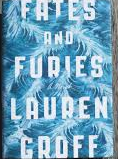Lancelot Satterwhite, called Lotto, and Mathilde Yoder, the central characters in Lauren Groff’s wonderful new novel “Fates and Furies,” meet as college students, marry young, and live together happily for many years. Lotto becomes a successful playwright and Mathilde manages his career and their lives as they move from basement flat in Greenwich Village to full-time life in the country, from penniless to comfortable. Lotto’s family is wealthy but his mother has cut him off as a result of his marriage to the penurious Mathilde. Lotto’s aunt Sallie and much younger sister Rachel stay in his life, and both of them slip money to Lotto and Mathilde from time to time. Lotto has a lifelong friend, Chollie, who also mistrusts Mathilde, and their relationship continues during the long period Mathilde outlives Lotto.
But the synopsis is the least of this novel, because midway through we’re thrust into a parallel narrative, where everything we thought we knew about Lotto and Mathilde and their marriage turns out to be incomplete. So there’s an alternative synopsis of this transcendent novel, involving an innocent trapped into marriage with a fortune hunter, and an alternative to that, because the novel can also be read as a quest – both Lotto and Mathilde are cut off, adrift from their families, and each seeks something more than the other provides in their lives together. A summary does not do this well-written, allusive, and deeply intelligent novel justice: it would be like trying to summarize the “Odyssey” – which is in fact one of the many books to which Groff’s text refers.
Like the synopsis, the characters can be read in very different ways. Take Mathilde, for example. By some accounts, including Lotto’s, she is incredibly good for, and to Lotto. She’s supported him while he tried and failed to make a living as an actor, and recognized and encouraged his genius as a playwright. She edits and helps shape his work, and she’s willing to live in his shadow. But Mathilde has shadows of her own, which Chollie senses from the beginning and which Lotto’s mother discovers with only a little effort. Mostly, Mathilde uses her shadowy contacts for Lotto’s good, and her own, but the shadiness means that, without his knowing it, Lotto is compromised. So does that make Mathilde good? Evil? It does not do this layered book justice to come to so simple a conclusion as to say that, like all other people, Mathilde is complicated.
The writing is skillful and beautiful throughout, with details that sear or flay and stick. Here’s just one example:
“You’re a pathological truth-teller,” Lotto once said to her, and she laughed and concede that she was. She wasn’t sure just then if she was telling the truth or if she was lying.
Great swaths of her life were white space to her husband. What she did not tell him balanced neatly with what she did.
In the novel’s first part, “Fates,” years pass in a couple of sentences, so when Groff slows down the reader must pay attention. In the second, “Furies” Groff fills in or tints the white spaces she has earlier left to the reader, and our understanding of the characters, and the marriage, deepens, shifts, but doesn’t necessarily converge.
“Fates and Furies” is, in the best possible way, a shape-shifting novel: for every interpretation, there’s another available: often directly contradictory yet equally plausible. The themes of family, marriage, guilt, redemption, creativity and yes, life and death course through it. Read this novel, and it will repay the work of the reader in thought-provoking resonance and depth.
Have a book you want me to know about? Email me at asbowie@gmail.com. I also blog about metrics at asbowie.blogspot.com.

